Related Research Articles
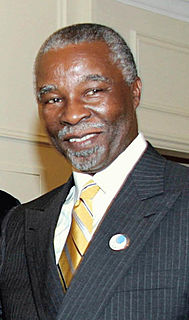
Thabo Mvuyelwa Mbeki is a South African politician who was the second president of South Africa from 14 June 1999 to 24 September 2008, when he resigned at the request of his party, the African National Congress (ANC). Before that, he was deputy president under Nelson Mandela between 1994 and 1999.

Govan Archibald Mvuyelwa Mbeki was a South African politician, military commander, Communist leader who served as the Secretary of Umkhonto we Sizwe, at its inception in 1961. He was also the son of Chief Sikelewu Mbeki and Johanna Mahala and also the father of the former South African president Thabo Mbeki and political economist Moeletsi Mbeki. He was a leader of the South African Communist Party and the African National Congress. After the Rivonia Trial, he was imprisoned (1963–1987) on charges of terrorism and treason, together with Nelson Mandela, Walter Sisulu, Raymond Mhlaba, Ahmed Kathrada and other eminent ANC leaders, for their role in the ANC's armed wing, Umkhonto we Sizwe (MK). He was sometimes mentioned by his nickname "Oom Gov".

Marthinus Christoffel Johannes van Schalkwyk is a South African politician, academic, lawyer, and apartheid-era intelligence operative. He is also a former MP and Minister of Tourism in the Cabinet of South Africa. Formerly Premier of the Western Cape and Leader of the Opposition in the Parliament of South Africa, he was the leader of the New National Party from its inception on 8 September 1997 until its dissolution on 9 April 2005. He was appointed Minister of Environmental Affairs and Tourism in the Thabo Mbeki administration after merging his party with the ruling African National Congress (ANC), despite the poor performance of the former in the 2004 General Election.

Ivy Florence Matsepe-Casaburri was a South African politician. She was the second Premier of the Free State and South Africa's Minister of Communications from 1999 until her death.
Jacob “Jackie” Sello Selebi was the National Commissioner of the South African Police Service from January 2000 to January 2008, when he was put on extended leave and charged with corruption. He was also a former President of African National Congress Youth League, South African ambassador to the United Nations from 1995 to 1998, and President of Interpol from 2004 to 2008. Selebi was found guilty of corruption on 2 July 2010 and sentenced to 15 years' imprisonment on 3 August 2010. However, he was released on medical parole in July 2012, after serving less than a year of his sentence, and lived at home until his death on 23 January 2015.

Essop Goolam Pahad is a retired South African politician. He served as the Minister in the Presidency from 1999 to 2008.

The 52nd National Conference of the African National Congress (ANC) was held in Polokwane, Limpopo, from 16 to 20 December 2007. At the conference, Jacob Zuma and his supporters were elected to the party's top leadership and National Executive Committee (NEC), dealing a significant defeat to national President Thabo Mbeki, who had sought a third term in the ANC presidency. The conference was a precursor to the general election of 2009, which the ANC was extremely likely to win and which did indeed lead to Zuma's ascension to the presidency of South Africa. Mbeki was prohibited from serving a third term as national President but, if re-elected ANC President, could likely have leveraged that office to select his successor.
The National Executive Committee (NEC) of the African National Congress (ANC) is the party's chief executive organ. It is elected every five years at the party national conference; the executive committee, in turn, elects a National Working Committee for day-to-day decision-making responsibilities. At the NEC's head is the President of the ANC, and it also contains the other so-called "Top Six" leaders: the Deputy President, Chairperson, Secretary-General, Deputy Secretary-General, and Treasurer-General.

The 51st National Conference of the African National Congress (ANC) was held at the University of Stellenbosch in Stellenbosch, Western Cape, from 16 to 20 December 2002, during the ANC's 90th anniversary. President Thabo Mbeki was re-elected to the party presidency and, notably, there was no change in other five top leadership positions except for Deputy Secretary General. There was also little competition for other spots on the National Executive Committee (NEC). This ANC conference has thus been called "the quietest in its history."
The following lists events that happened during 2008 in South Africa.
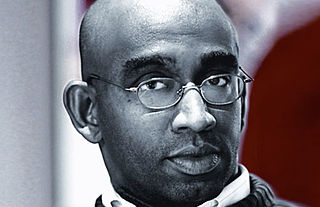
Ronald Suresh Roberts is a British West Indian biographer, lawyer and writer. He is best known for his biographies of some of the leading figures in the "New South Africa" such as Nobel Prize winner Nadine Gordimer and former South African President Thabo Mbeki. Roberts has been described by Nelson Mandela as "a remarkable and dynamic young man". He currently lives in London, England.
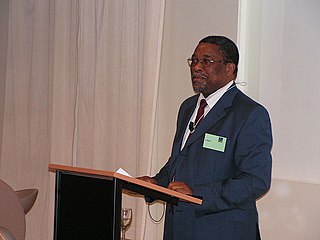
Moeletsi Goduka Mbeki is a South African political economist and the deputy chairman of the South African Institute of International Affairs, an independent think tank based at the University of the Witwatersrand, and is a political analyst for Nedcor Bank. He is a member of the executive council of the International Institute for Strategic Studies (IISS) which is based in London. He is the younger brother of former President Thabo Mbeki and son of ANC leader Govan Mbeki. He has been a frequent critic of President Mbeki.

Endgame is a 2009 British film directed by Pete Travis from a script by Paula Milne, based upon the book The Fall of Apartheid by Robert Harvey. The film is produced by Daybreak Pictures and reunites Travis with Vantage Point actor William Hurt. It also stars Chiwetel Ejiofor, Jonny Lee Miller and Mark Strong. The film dramatises the final days of apartheid in South Africa. It was filmed at locations in Reading in England and Cape Town, South Africa in the first half of 2008 and was completed in December that year.
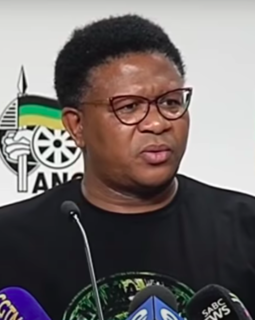
Fikile April Mbalula is a South African politician who is currently serving as Minister of Transport. He previously served as both Minister and Deputy Minister of Police and Minister of Sports and Recreation. Mbalula is a member of the National Executive Committee of the African National Congress and former leader of the African National Congress Youth League. He is ethnically a Mpondomise, his clan name is Jola. Mbalula also serves as the head of elections for the African National Congress.

The Congress of the People (COPE) is a South African political party formed in 2008 by former members of the African National Congress (ANC). The party was founded by former ANC members Mosiuoa Lekota, Mbhazima Shilowa and Mluleki George to contest the 2009 general election. The party was announced following a national convention held in Sandton on 1 November 2008, and was founded at a congress held in Bloemfontein on 16 December 2008. The name echoes the 1955 Congress of the People at which the Freedom Charter was adopted by the ANC and other parties, a name strongly contested by the ANC in a legal move dismissed by the Pretoria High Court.
Mark Gevisser is a South African author and journalist. His latest book is The Pink Line: Journeys Across the World's Queer Frontiers (2020). Previous books include A Legacy of Liberation: Thabo Mbeki and the Future of the South African Dream and Lost and Found in Johannesburg: A Memoir. His journalism has appeared in many publications, including The Guardian, The New York Times, Granta, and the New York Review of Books.

Botswana–South Africa relations refers to the historical and current relationship of Botswana and South Africa. Botswana has a high commission in Pretoria and South Africa has a high commission in Gaborone. Both countries are former British colonies and members of the African Union, the Commonwealth of Nations and the Southern African Development Community (SADC).

South Africa–Zimbabwe relations have been generally cordial since the end of apartheid in South Africa, although there have been tensions due to political troubles in Zimbabwe in recent years.
Molotov Cocktail is a quarterly magazine published in South Africa. Molotov Cocktail is edited by James Sanders.
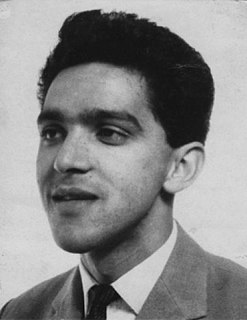
Ahmed Timol was an anti-apartheid activist in the underground South African Communist Party. He died at the age of 29 from injuries sustained when he fell from the top floor of John Vorster Square police station in Johannesburg. Police claimed, and an official inquest confirmed, that Timol had committed suicide by jumping out the window. The claim was widely disbelieved in anti-apartheid circles, and in the movement Timol's death became symbolic of the broader phenomenon of deaths in police custody, as well as of the abuses and dishonesty of the apartheid state.
References
- ↑ "Prepare Now For The Second Revolution - The Mail & Guardian". 30 September 1994.
- ↑ http://www.sabcnews.com/politics/government/0,2172,155025,00.html [ dead link ]
- ↑ http://www.iol.co.za/index.php?set_id=1&click_id=594&art_id=vn20070118060315893C889521 [ dead link ]
- ↑ "Aids, lies and dissidents - The Mail & Guardian". 15 October 2008.
- ↑ "Anthony Brink strikes back - NEWS & ANALYSIS | Politicsweb".
- ↑ "Archived copy". Archived from the original on 2012-12-27. Retrieved 2015-04-27.
{{cite web}}: CS1 maint: archived copy as title (link)